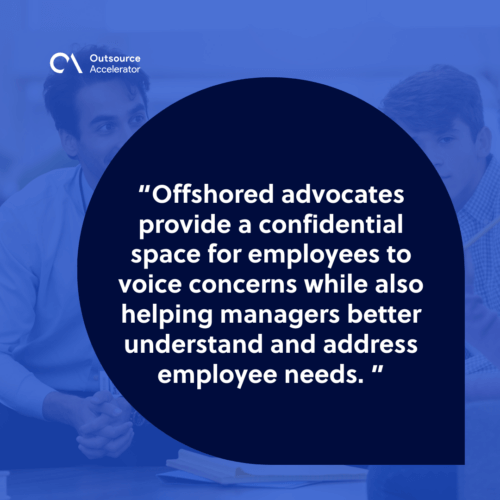Offshore employee advocates’ great value to growing businesses

As businesses expand globally, managing employee well-being and fostering strong relationships become increasingly complex.
Enter the concept of offshoring employee advocates—professionals who serve as dedicated liaisons between employees and management.
With the growing demand for global workforces and remote teams, employee advocates have become a significant element in making employees feel supported, heard, and valued.
In this blog, we’ll explore the essential role of offshore employee advocates and their value to businesses. We’ll also provide practical tips when hiring these experts.
8 key responsibilities of offshored employee advocates
Offshored employee advocates’ primary functions collectively contribute to creating a more engaged, compliant, and satisfied workforce.
Their key responsibilities include:
1. Employee support and advocacy
Advocates are the voice of employees, addressing their concerns, implementing fair treatment, and promoting a positive workplace. They act as intermediaries, making employees feel heard and supported.

2. Conflict resolution
When issues arise between staff or between employees and management, advocates help mediate and resolve conflicts. These specialists ensure that disputes are handled impartially, leading to better workplace harmony and reduced turnover.
3. Ensuring legal and policy compliance
Offshore employee advocates see to it that businesses adhere to local labor laws and regulations.
They keep both the company and employees informed about their rights and obligations. As a result, reducing legal risks and maintaining compliance.
4. Employee engagement and satisfaction
Pew Research Center’s survey on How Americans View Their Jobs revealed that the top three elements impacting job satisfaction are:
- 67% relationship with co-workers
- 62% relationship with the management
- 59% commute
Advocates work to boost employee morale by addressing concerns before they escalate and offering solutions that enhance the overall work experience.
Their efforts directly contribute to higher job satisfaction and retention rates.
5. Facilitating clear communication
They bridge any communication gaps between employees and management, ensuring that both sides are on the same page. Advocates provide a confidential and neutral channel for employees to voice concerns and feedback.
6. Training and education on company policies
Offshore advocates are responsible for educating employees on company policies, benefits, and available resources.
This ensures employees are well-informed and feel confident in the company’s support structure.
7. Cultural sensitivity and inclusion
According to LinkedIn’s survey on diversity and inclusion in the workplace, 60% of respondents believe diversity within their sales teams has significantly impacted their success.
As for offshore employee advocates, they often have an understanding of local cultures and issues that may affect employees in different regions. Their sensitivity to cultural differences helps build an inclusive environment and promotes a positive, diverse workplace.
8. Promoting career development
These experts support employees’ career growth by addressing developmental needs.
They give the workforce access to opportunities like training, mentorship, or career progression paths within the company.

5 benefits of offshore employee advocates
Offshored employee advocates are increasingly recognized for their ability to help businesses navigate the complexities of managing diverse, global teams.
Offshoring this critical function allows businesses to take full advantage of the following:
1. Enhanced employee satisfaction and retention
Offshored employee advocates focus on creating a positive work environment by addressing concerns quickly and fairly. Their ability to resolve issues before they escalate helps boost employee morale, which leads to higher satisfaction and greater retention rates.
Employee satisfaction increases a company’s chances of long-term retention, which lowers turnover expenses.
2. Access to global expertise and local insights
These professionals bring valuable cultural and legal expertise that is tailored to specific regions.
They understand the nuances of local labor laws, customs, and employee needs. This strategy helps ensure compliance and improve overall employee experiences across various locations.
3. Improved communication
Offshored advocates provide a confidential space for employees to voice concerns while also helping managers better understand and address employee needs.
They specialize in handling disputes impartially, ensuring that both parties are heard and that solutions are reached efficiently.
This reduces misunderstandings and promotes a more harmonious work environment. Their ability to manage conflicts remotely and resolve issues proactively helps maintain smooth operations and productivity.
4. Ensuring legal and regulatory compliance
Employee advocates help businesses stay compliant with local labor laws, reducing the risk of costly legal disputes. They are knowledgeable about the regulatory requirements in different countries.
Businesses remain compliant with employment standards, health and safety protocols, and other legal obligations specific to each region.
5. Focus on core business functions
Offshoring helps businesses free up internal resources, allowing HR teams and management to focus on higher-value tasks such as:
- Strategic planning
- Growth initiatives
- Talent development
Employee advocates handle day-to-day employee concerns, creating bandwidth for leadership to drive business success.
Practical tips when offshoring employee advocates
Offshoring employee advocates can provide valuable support to your business, but it’s essential to ensure the integration is smooth and effective.
Here are three practical tips to maximize the success of offshoring this critical function:
Choose a partner with local expertise
Your offshore employee advocates must be familiar with local labor laws, cultural norms, and employee needs.
A service provider that understands the specific requirements of the regions you operate in will help ensure compliance and improve the overall effectiveness of your advocacy efforts.
Maintain clear communication channels
Regular communication between offshore advocates and in-house teams is crucial for alignment.
Establish processes for reporting, feedback, and issue resolution. Both sides should be on the same page and employee concerns should be addressed promptly.
Invest in training and onboarding
Provide thorough training to offshore advocates about your company’s culture, values, policies, and expectations. This helps them better understand your organization’s needs.
Cultivate a supportive work culture that boosts employee satisfaction and long-term success through offshore employee advocates.







 Independent
Independent




